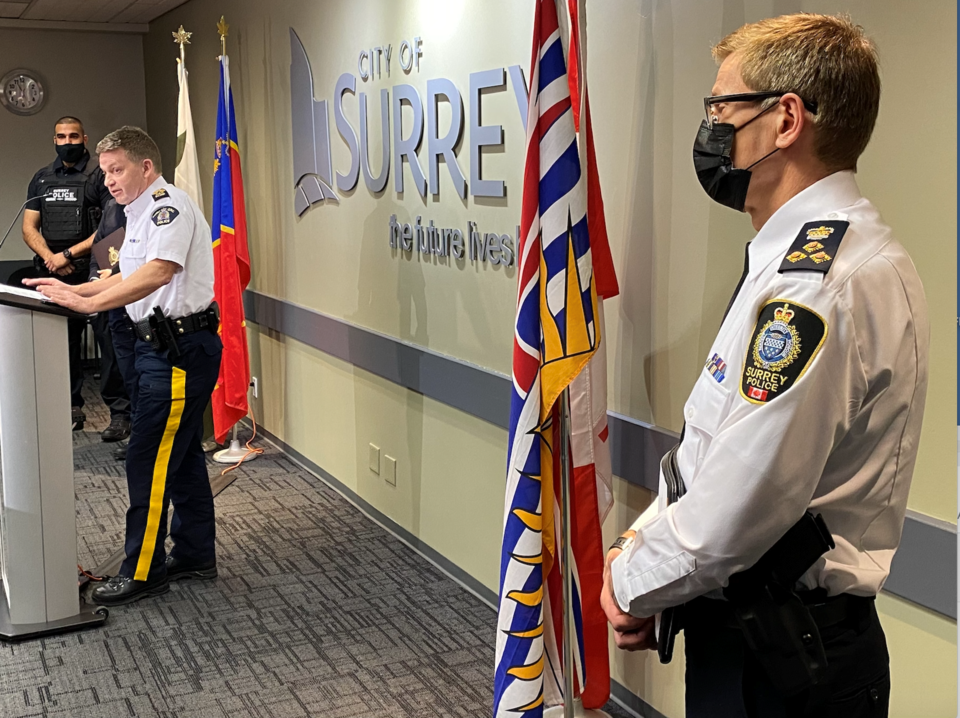Surrey’s top Mountie, assistant commissioner Brian Edwards, says a Surrey Police Service (SPS) transition report is “astoundingly arrogant” and a “disservice to the policing community” for its attacks on the RCMP.
The report was submitted Dec.22 to the Ministry of Public Safety and Solicitor General to outline the SPS' ability to become the police of jurisdiction for the city next year.
The police transition project began in November 2018, led by then Surrey mayor Doug McCallum.
However, newly-elected mayor Brenda Locke spearheaded a plan last month, to put a stop to the SPS.
Public Safety Minister Mike Farnworth now has the option to either approve the project or choose to continue the transition from Surrey RCMP to SPS, a move Farnworth approved in February 2020.
The SPS report, however, is as much about the RCMP’s flaws as it is about the service’s strengths to carry on with the transition.
“It is truly unfortunate the transition has gotten to a point where SPS continually resorts to fear mongering and I need to respond,” said Edwards, who does not name SPS Chief Norm Lipinski, who approved the report.
“Their report makes sweeping and broad generalizations about the RCMP, dedicating a significant portion of their narrative seeking to discredit the RCMP, and questioning the RCMP’s ability to deliver effective policing in Surrey,” said Edwards in a written statement to media.
The SPS report pulls few punches from the RCMP: “Numerous independent investigations over the past decade have documented the RCMP’s unhealthy organizational environment and the absence of a respectful workplace, free of bullying, harassment, and a negative culture,” it reads.
The report specifically mentions the RCMP's mishandling of incidents of sexual harassment, as evidenced in numerous court cases.
This, the SPS said, is why its union claims 95 per cent of its membership will not work for the RCMP.
The report goes on to argue that the RCMP as an institution is facing “significant, systemic” recruitment challenges, as claimed by its union, the National Police Federation.
And since vacancies have formed in other Lower Mainland RCMP detachments as a result of those recruitment challenges, SPS argues it's logical for the province to keep the transition going, as existing Surrey RCMP officers can fill those vacancies.
But Edward said the SPS “handpicked” statistics on RCMP recruiting.
Edwards further responded to the report’s claims: “I can also say that multiple SPS officers have confidentially approached the RCMP indicating their desire to come over if the RCMP remains in Surrey. To now, I’ve held back on this but again, the continued narrative that 94 per cent will not patch over or will seek to end their policing careers is utterly divisive and zero sum. To what end I ask?”
The City of Surrey’s de-transition report (consulted upon by former RCMP deputy commissioner for Western and Northern Canada Peter German) assumes 25-50 per cent of SPS officers may revert to wearing the red serge.
As of Dec. 15, SPS has hired 315 sworn officers (109 with RCMP experience, 178 with municipal/other experience and 28 new recruits). However, there are only 189 sworn SPS officers on duty, working under the command and supervision of Surrey RCMP. The remaining 126 sworn officers are doing administrative and policy work.
The SPS report also claimed, with little detail, that some SPS officers, who currently fall under Surrey RCMP supervision and command, have filed workplace complaints.
The report makes the case that SPS can better respond to local needs, including providing mental health services, assigning staff to specific needs and procurement of goods.
“SPS is a start-up police agency that is utterly dependent upon the RCMP, and is, at the same time, seeking to advance a narrative that questions whether the RCMP can effectively police Surrey. It is astoundingly arrogant and is a disservice to the policing community,” said Edwards.
“SPS’s continued focus on discrediting the RCMP is unprofessional and unbecoming of a police service aiming to serve the second largest city in –°¿∂ ”∆µ.,” stated Edwards.
Finally, the report calls into question the city’s estimates on cost savings — a key impetus for Locke's opposition to the project. The SPS says the annual operating cost difference is closer to $18 million, not the $32 million the city projects.
The SPS report’s estimates rely on an initial transition report from between the City of Surrey, City of Vancouver, Vancouver Police Department, and Dr. Curt T. Griffiths (SFU). That report, however, pegged the transition costs at $45 million and never contemplated the double costs of having two detachments, as well as the policy work being conducted by SPS off-duty officers.
The city’s latest de-transition report showed the transition, if it’s maintained, will cost $268 million above the police operations budget over the next four years, largely due to one-time capital costs and the overlapping costs of hiring new officers while existing ones remain on duty.
Edwards’ statement did not address costs.
“What I’d like to see, and what we should all expect to see, is an approach to managing the transition that puts public and police officer safety at the forefront. I’m yet to be convinced SPS understands their role in this,” Edwards concluded.



